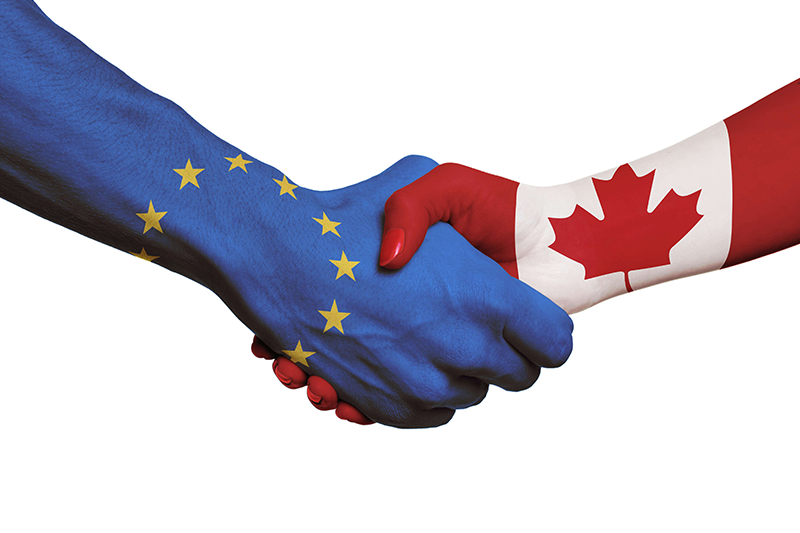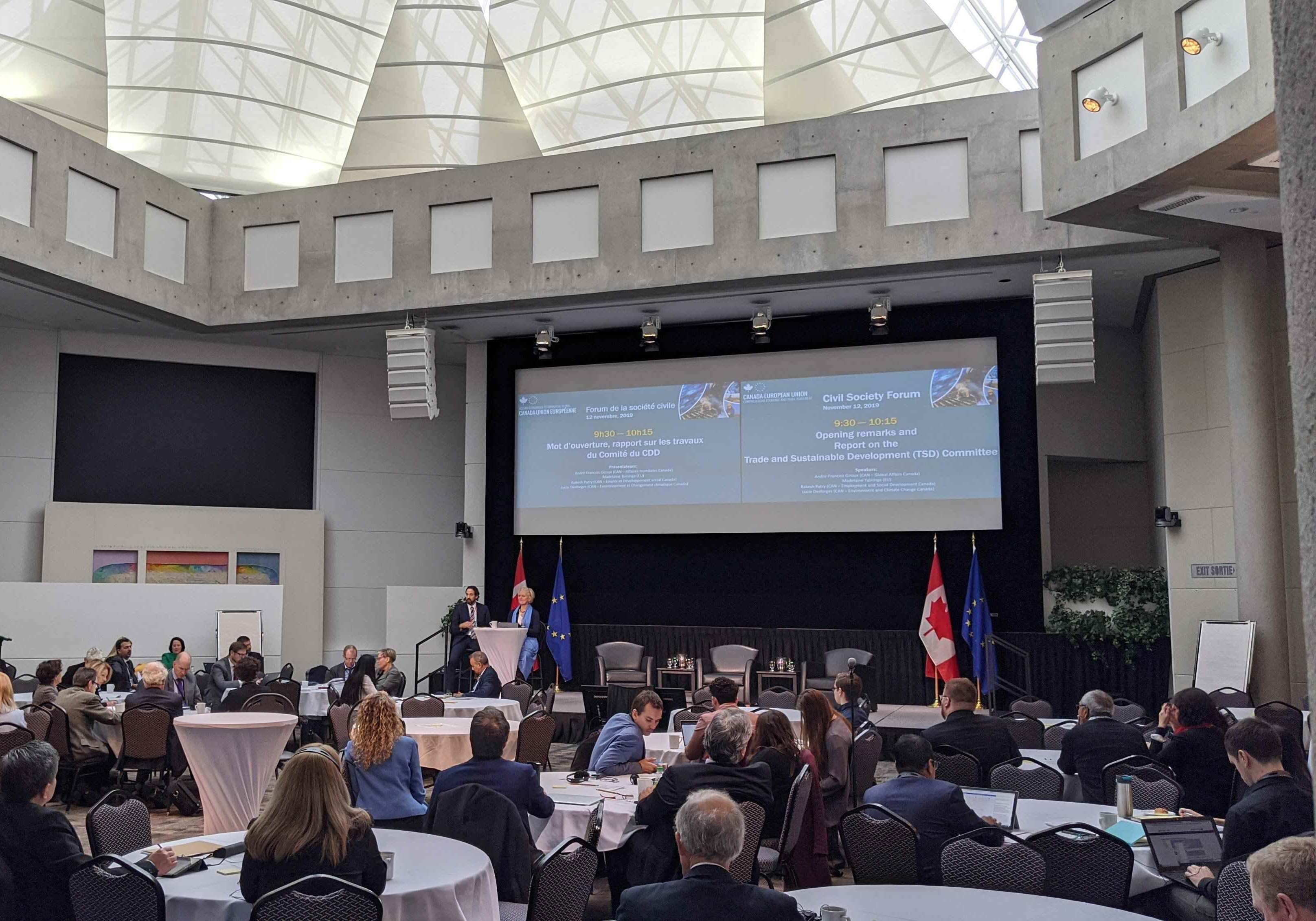Is civil society involved in the EU’s trade policy? The case of CETA.

The European Commission is sometimes caricatured as an “unelected Brussel’s bureaucracy” that is not interested in involving civil society in its thirst for power. In reality, things are quite different, even if the Commission does play a key role in EU external relations.
Take the example of trade policy, which is clearly an EU competence. This means that EU member states cannot set their own trade policy or negotiate their own trade agreements but must rely on the European Commission as a quasi “European government” in this area.
Civil society’s growing interest in EU trade policy
It is true that civil society has been formally involved in EU trade policy only relatively recently. But, to be fair to the European Commission, civil society has long shown little interest in EU trade policy itself.
Interest among European NGOs picked up only in the late 1990s, resulting in the establishment of “Civil Society Dialogues” as a formal mechanism for bringing together European Commission officials and civil society representatives.
Today, civil society is even more heavily involved in EU trade policy. One example is the Comprehensive Economic and Trade Agreement (CETA), which has been concluded between the EU and Canada and was highly politicized in some EU member states. Today, CETA is implemented (albeit thus far only provisionally) through various committees typical for international EU agreements.
The highest such “joint body” established by CETA is the CETA joint committee bringing together the European Commissioner for Trade and the Canadian Minister for Trade. The CETA joint committee similarly takes into account input by civil society, even if yet another committee is even more important in this regard.
The Committee on Trade and Sustainable Development deals with issues such as labor standards, the involvement of the indigenous peoples in Canada, and climate change. Civil society representatives are systematically involved in these areas and can help move these issues forward.
How is civil society involved?
The prime organ through which civil society is involved in CETA is the Civil Society Forum, which came together for the first time in September 2018 in a small gathering. By the second meeting in November 2019, it has grown to approximately 200 participants drawn from both the EU and Canada. Civil society representatives took the opportunity to engage with European Commission and Canadian officials and let them know that CETA should not increase CO2-emissions, for example by enabling indigenous peoples in Canada to access clean technology.
 Picture of the second CETA Civil Society Forum in November 2019 in Ottawa. Because of the pandemic, the third and fourth Civil Society Forum in 2020 and 2022, respectively, were held only online. Copyright: DG Trade/EU.
Picture of the second CETA Civil Society Forum in November 2019 in Ottawa. Because of the pandemic, the third and fourth Civil Society Forum in 2020 and 2022, respectively, were held only online. Copyright: DG Trade/EU.
Another important mechanism for civil society to have its say are the Domestic Advisory Groups. There is one group for the EU and a different one for Canada. The EU filled its Domestic Advisory Group through a public call with organizations having expertise in EU–Canada trade.
While the composition of the group is mainly defined by business and labor groups as well as the European Economic and Social Committee, it also involves organizations dealing with issues such as animal welfare or the environment.
While also actively participating in the Civil Society Forum, the domestic advisory groups of the EU and Canada also meet alone to try and influence their respective governments during the implementation of CETA. Still, the two groups also meet each other to discuss how to implement CETA in a sustainable fashion.
🇪🇺🇨🇦 #EUTrade work is now over in Ottawa. How did this #TradeDiAloGue go?
📺 We asked the participants @PaulJLansbergen @phdebuck @liina_carr @SuneSandbeck @Steph_ghislain @oefitzgerald
@EESC_Trade @EUinCanada pic.twitter.com/JntNOMFdDd— EU Trade 🇪🇺 (@Trade_EU) November 13, 2019
You can watch short interviews with selected participants of the EU and Canadian domestic advisory groups on Twitter. Copyright: DG Trade/EU.
For example, in September 2020 the EU and Canadian domestic advisory groups adopted a joint statement calling for increased transparency and more resources to monitor the implementation of CETA, also beyond chapters on trade and sustainable development. The European Commission and government of Canada replied to, and largely supported, the joint statement.
From inclusion to influence
As this short blog post has shown, civil society is today structurally involved in the implementation of trade agreements. But does this involvement also translate into influence, changing positions of the EU or Canada during implementation? That question is more difficult to answer.
Still, as recently as June 2022 the European Commission adopted a communication that civil society should be even more involved in EU trade agreements (also outside chapters on sustainable development), transparency should be further improved, and domestic advisory groups will receive more support to finance their work.
For all intents and purposes, the influence of civil society during the implementation of trade agreements is only set to increase in the years ahead.
Did you find this post interesting? Would you like to learn more about the EU and trade policy? Come to the Paris Lodron University of Salzburg to study, for example:
- MA in European Union Studies,
- BA or MA in Political Science,
- MA in Political Science – Integration and Governance.
We’d be happy to have you!
Author of the blogpost:
Dr. Markus Gastinger, Marie Skłodowska-Curie Fellow | Rudolfskai 42 | A-5020 Salzburg |
markus-gastinger.eu | twitter.com/MarkusGastinger
*This project has received funding from the European Union’s Horizon 2020 research and innovation programme under the Marie Skłodowska-Curie grant agreement No. 840135.
Photo Credits:
DG Trade/EU
Cristof Echard/EU





